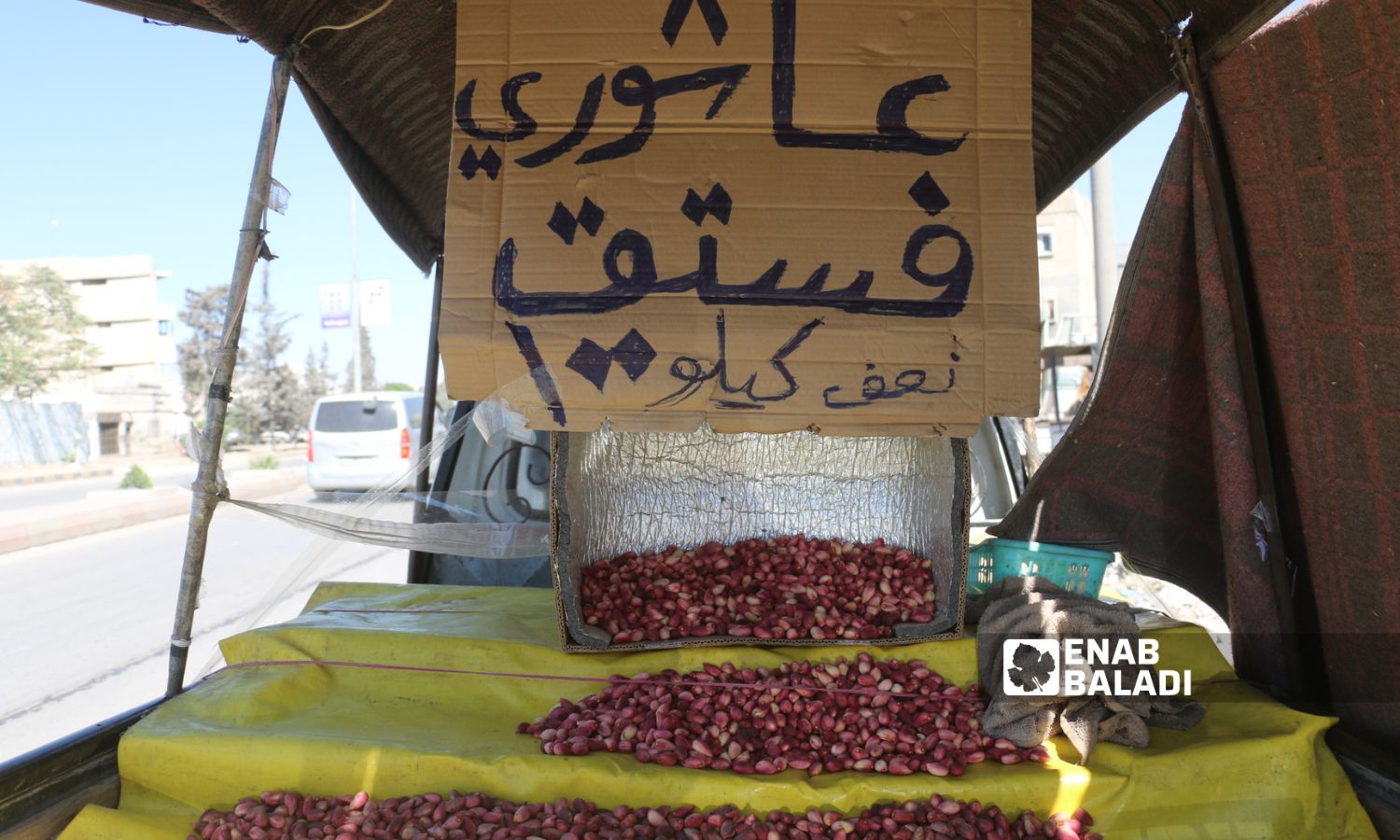



Aleppo countryside – Dayan Junpaz
The Aleppo pistachios collecting season in the northern and eastern countryside of Aleppo recently ended, only for farmers to discover that the yield was not what they had hoped due to the additional costs and unexpected weather fluctuations that accompanied the season before the pistachios ripened.
Weather fluctuations have negatively affected the growth of fruits and the production process of pistachios, and paying for fertilizers and medicines in US dollars has raised farmers’ fears of losses or achieving low profits.
The sale of pistachios, which is a strategic crop in the region, is limited to local markets, and they are exported through traders who are accused of fixing their purchase and export prices and making large profits compared to what the farmer receives.
Farmers cannot bear the burden of shipping and distributing pistachios outside the Aleppo countryside due to the high costs the process requires, the farmers’ weak experience in markets outside their regions, or the difficulty of distributing the product in other regions.
Muhammad al-Hamad, a farmer in the eastern countryside of Aleppo, told Enab Baladi that his land contains 1,200 fruitful pistachio trees distributed over an area of 50 dunams in the village of al-Dhahiriyah in the Jarablus countryside, eastern Aleppo. (Dunam = 900 m2)
The farmer explained that there was a discrepancy in production compared to last year, as he collected his crop at the beginning of last August, and the amount of production amounted to five tons of pistachios, which earned him $15,000, noting that 75% of the proceeds are spent as operational expenses.
He added that the price of one kilo of pistachios ranges between $2.5 and $3, pointing out that the amount of production was half of last year’s production due to weather conditions and the high prices of fuel and pesticides.
Collecting pistachios requires a lot of labor, and the harvest worker’s wage is 100 Turkish liras per day.
Regarding costs, al-Hamad said that pistachio trees need extreme care and that his land needs watering five times annually, plowing seven times, and urea fertilizer, black phosphate, and compound fertilizer, according to a specific schedule.
He added that each hectare requires medicines worth $300 each year, ten bags of urea fertilizer, and five bags of compound fertilizer at a cost of $550, in addition to organic fertilizer over a period of two years.
Organic fertilizer is placed on the surface of the soil before plowing and then stirred, according to the farmer, pointing out that some lands do not need this fertilizer because of their fertility and richness in organic materials and iron.
Many farmers in rural Aleppo face problems from the lack of export abroad through the Turkish border crossings and the monopoly of some local merchants on the process of selling Aleppo pistachios and controlling their prices in the markets.
This affects the decline in farmers’ returns and the difficulty of their living conditions, as they depend on agriculture as a main source of income. Their living situation declines as it declines and improves as it improves.
Abdul-Majeed Ashour, a farmer in the border city of Azaz in the northern countryside of Aleppo, told Enab Baladi that some merchants are the ones who control the buying and selling of Aleppo pistachios by fixing their prices in local markets.
The farmer stated that the crop was sold locally or through merchants who brought it into Turkey or into regime-controlled areas, and the merchants often had the largest profit return at the expense of the farmer.
The farmers’ complaint is not limited to the pistachio crop; with every season, farmers complain about the low purchase price of their crops by the Syrian Interim Government (SIG) or the merchants’ control over their purchase prices, as happened recently in Ras al-Ain, northwest of al-Hasakah, where the Interim Government abandoned purchasing wheat from farmers and left them “a hostage” in the hands of merchants, Enab Baladi reported on September 8.
Pistachio cultivation has expanded in the northern and eastern countryside of Aleppo over the past years and has become an alternative for many farmers to their traditional crops, such as wheat, barley, and legumes, despite pistachios’ high costs of cultivation and the delay in its production years, which exceed eight years at the very least.
Hassan al-Hassan, Director of Aleppo Agriculture in the Interim Government, told Enab Baladi that the Aleppo pistachio tree occupies a good position among the crops spread in Aleppo governorate in general and in the city of Jarablus in particular, which is considered one of the most important areas in which this agriculture is widespread.
The area cultivated with pistachios in areas controlled by the Interim Government is estimated at 19,149 hectares, and the number of fruit trees is 2,336,178 trees, and this year’s season’s production is estimated at 18,700 tons, according to al-Hassan.
The Aleppo Agriculture Director added that the pistachio season is of economic importance in the region, and its fruits have a high nutritional value and that its financial return to farmers is good in rain-fed agricultural areas compared to other crops.
if you think the article contain wrong information or you have additional details Send Correction